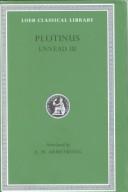Ennead
By Plotinus

"Ennead" was published by Heinemann in 1967 - London, it has 417 pages and the language of the book is mul.
“Ennead” Metadata:
- Title: Ennead
- Author: Plotinus
- Languages: mul - English
- Number of Pages: 417
- Publisher: Heinemann
- Publish Date: 1967
- Publish Location: London
“Ennead” Subjects and Themes:
- Subjects: ➤ One (The One in philosophy) - Ontologie - Philosophie ancienne - Ancient Philosophy - Ouvrages avant 1800 - Anthropologie philosophique - Un (L'Un en philosophie) - Soul - Cosmologie antique - Dieu - Early works to 1800 - Néo-platonisme - Âme - Form (Philosophy) - Plotinus - Philosophers - Philosophy
Edition Specifications:
- Pagination: viii,417p. ;
Edition Identifiers:
- The Open Library ID: OL17280135M - OL16233430W
- Online Computer Library Center (OCLC) ID: 690682
- Library of Congress Control Number (LCCN): 66031871
- ISBN-13: 9780434994427
- ISBN-10: 0434994421
- All ISBNs: 0434994421 - 9780434994427
AI-generated Review of “Ennead”:
"Ennead" Description:
The Open Library:
PLOTINUS (A.D. 204/5-270), possibly of Roman descent, but certainly a Greek in education and environment, was the first and greatest of Neoplatonic philosophers. Practically nothing is known of his early life, but at the age of 28 he came to Alexandria, and studied philosophy with Ammonius 'Saccas' for 11 years. Wishing to learn the philosophy of the Persians and Indians he joined the expedition of Gordian III against the Persians in 243, not without subsequent danger. Aged 40 he came to Rome and taught philosophy there till shortly before his death. In 253 he began to write and continued to do so till the last year of his life. His writings were edited by his disciple Porphyry, who published them many years after his master's death in six sets of nine treatises each (the Enneads). He regarded Plato as his master, and his own philosophy is a profoundly original development of the Platonism of the first two centuries of the Christian era and the closely related thought of the Neophthagoreans, with some influences from Aristotle and his followers and the Stoics, whose writings he knew well but used critically. There is no real trace of Oriental influence on his thought, and he was passionately opposed to Gnosticism. He is a unique combination of mystic and Hellenic rationalist. He was deeply respected by many members of the Roman aristocracy and a personal friend of the Emperor Gallienus and his wife. He devoted much of his time to the care of orphan children to whom he had been appointed guardian. But before his death his circle of friends had broken up, and he died alone except for his faithful friend and doctor Eustochius. His thought dominated later Greek philosophy and influenced both Christians and Moslems, and is still alive today because of its union of rationality and intense religious experience.
Read “Ennead”:
Read “Ennead” by choosing from the options below.
Search for “Ennead” downloads:
Visit our Downloads Search page to see if downloads are available.
Borrow "Ennead" Online:
Check on the availability of online borrowing. Please note that online borrowing has copyright-based limitations and that the quality of ebooks may vary.
- Is Online Borrowing Available: Yes
- Preview Status: restricted
- Check if available: The Open Library & The Internet Archive
Find “Ennead” in Libraries Near You:
Read or borrow “Ennead” from your local library.
- The WorldCat Libraries Catalog: Find a copy of “Ennead” at a library near you.
Buy “Ennead” online:
Shop for “Ennead” on popular online marketplaces.